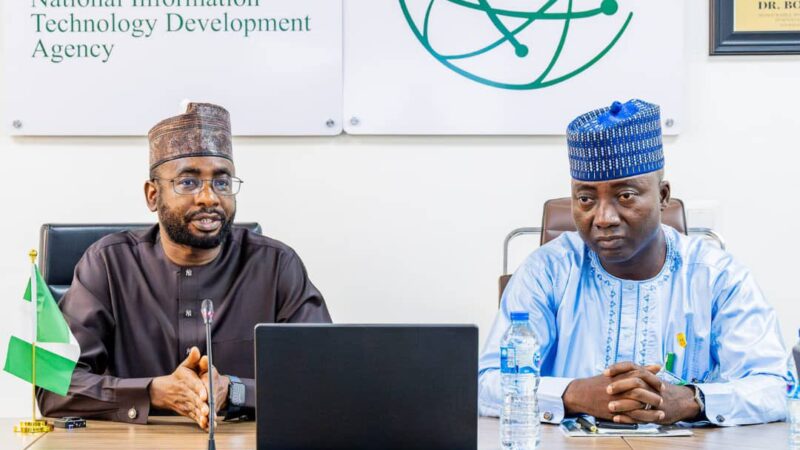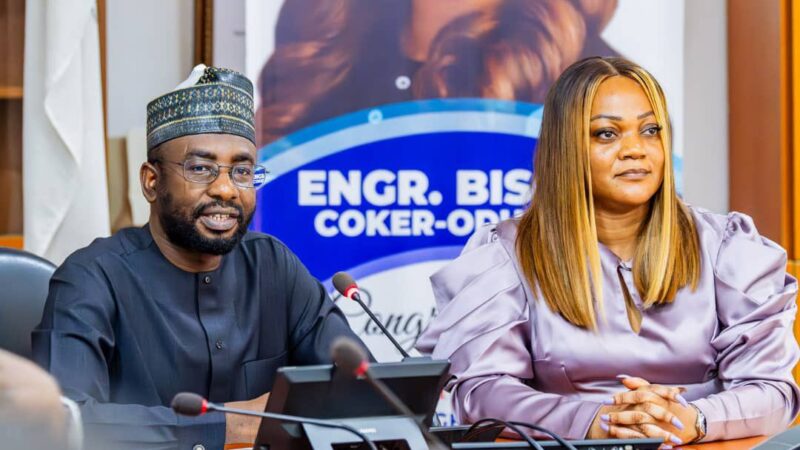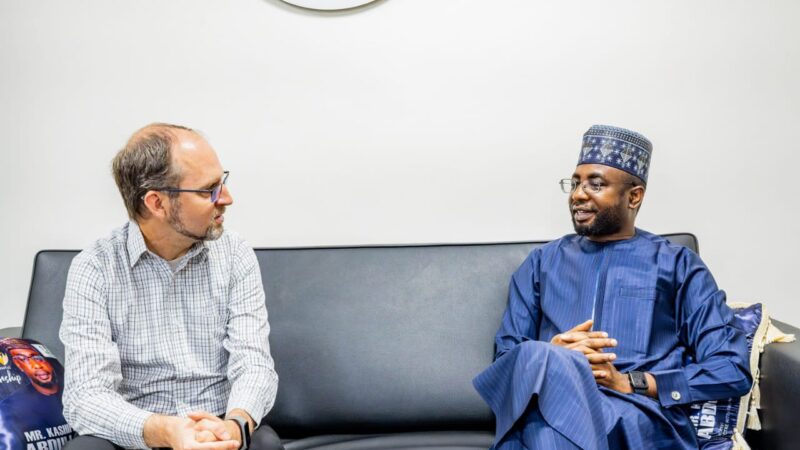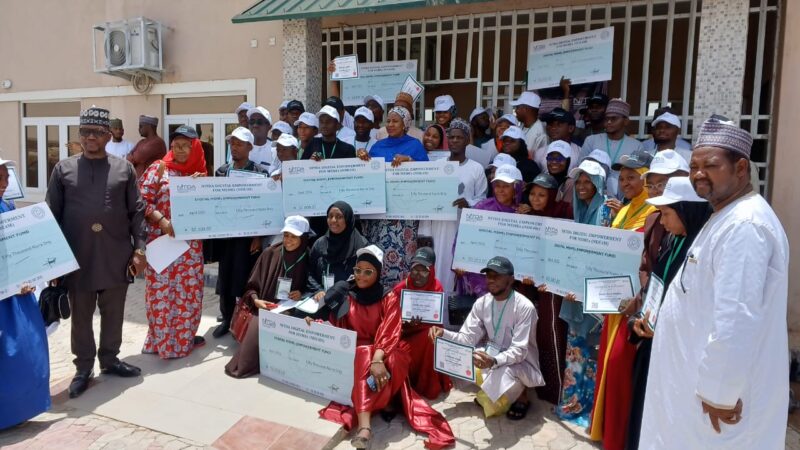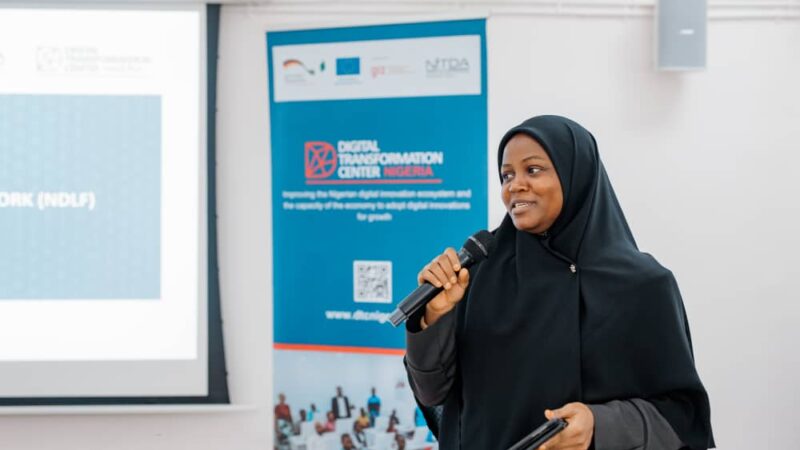FG Partners Coursera To Train 24,000 Nigerians On Digital Skills
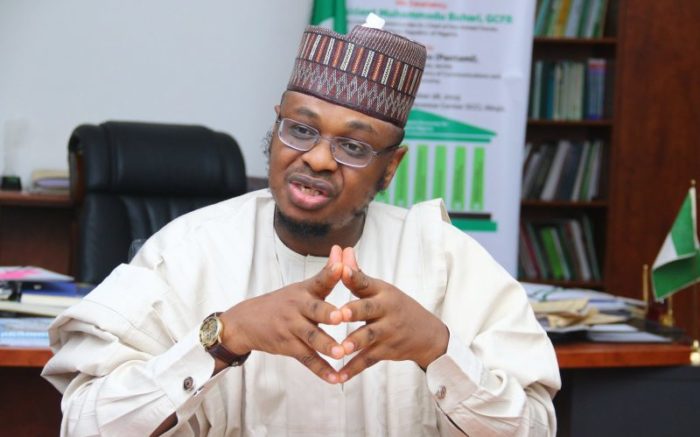
The Federal Government, in its stride to upscale the impact of digitisation, has partnered with Coursera, a global online digital skills acquisition platform to launch a free nationwide digital training programme through the collaborative efforts of the Federal Ministry of Communications and Digital Economy (FMoCDE) towards the implementation of the digital economy mandate.
Declaring the launching of the training sessions open to the public on behalf of President Muhammadu Buhari, the Minister of Communications and Digital Economy, Professor Isa Ali Ibrahim (Pantami), asserted that championing a paradigm shift of prioritising hard, soft, and social skills over theory will enhance the speed of digitisation processes for the development of the economy.
The Minister acknowledged Coursera as one of the world’s top online learning platforms, hosting thousands of courses for some of the best universities and companies, and has remained at the forefront of providing the global society with the education and resources it needs to build and maintain digital systems.
Prof. Pantami assured the Federal Government’s support towards an enabling digital economy through the various empowerment programs geared at positioning the nation’s citizens for the fourth industrial revolution.
“The recent Memorandum of Understanding (MoU) entered into, with Microsoft to train five million Nigerians in various fields of technology, is part of government’s attempt to fulfill the requirements for digital transformation as laid down in the Nigeria Digital Economy Policy and Strategy (NDEPS) document,” he said.
The Minister also implored Coursera to expand its presence in Nigeria, especially in academia, where it has an existing partnership with Covenant University.
“Coursera is in partnership with Covenant University which is one of the best private universities in Nigeria based on their annual rankings and publications which I have keenly observed. I have no doubt that this partnership has had a huge impact on the institution’s excellent standing. I, therefore, request that Coursera engages more academic institutions, at least one, in each geo-political zone and bring their expertise to bear within the identified environments,” he said.
The Federal Government of Nigeria, through the Federal Ministry of Communications and Digital Economy, is spearheading this collaboration under the auspices of the National Information Technology Development Agency (NITDA).
The Director-General of NITDA, Kashifu Inuwa, CCIE, on his part, expressed his excitement about the partnership as he revealed the benefits associated with the opportunity.
He stated that the collaboration would position Nigerians in bridging the talent gap that has risen due to the global adoption of digital transformation tools and channels for economic development.
He said, “ironically there are unemployment and unfilled job vacancies. Globally there are more than 30 million unfilled jobs but still, we have a high rate of unemployment even in Nigeria. In the last two months, there has been a massive resignation from the banking sector, with most of the IT experts relocating to take up IT-related jobs or joining FINTECH.”
Inuwa affirmed that the present administration has built its premise on social investment which he described as investing in the Nigerian people.He said, “Government started its diversification by investing in people through massive capacity building programmes, provision of interventions for people to establish their own businesses, using both online and physical channels of learning environments”.
Referring to a research report by PwC on Nigerian brand capital, he noted their recommendation to Nigerians not to follow the legacy process for development that most Asian and European countries followed. He said that those countries moved from Agric projection to low-end value manufacturing to high-end value manufacturing which according to history took them 40years to attain the status of a developed country.Today, he asserts, there is a shortcut that can be leveraged upon by Nigerians which is the human capital route. “Nigeria can become the global talent factory to supply talent to the globe”. He made further reference to the Conifer research which states that by 2030, there is going to be a 35 million talent deficit globally, from the US having about 6 million talent deficits to Japan, Brazil, and China going to have about 18 million each except for India that will have a surplus of 1 million talent. This he explained would give talented Nigerians the competitive advantage to place and position itself to fill the gap and easily become a global superpower.Postulating that by 2030 Nigeria would be the 4th most populous country in the world, this manpower advantage coupled with the natural talents in Nigerians would become a global competitive edge that would enhance economic growth, argued the NITDA boss.“We need to do things we need to bridge the talent gap and the connectivity gap”, he encouraged.While emphasizing the importance of the National Digital Economy Policy and Strategy (NDEPS) of the Ministry of Communications and Digital Economy as the foundational guide that contains over 19 policies that would enable the national broadband plan to bridge the connectivity gap, Inuwa noted that NITDA structured its Strategic Pillar and Action Plan (SRAP) towards the implementation of the NDEPS. “We have Digital Literacy and Capacity Building as a strategic pillar to complement the National Digital Literacy framework, in achieving the Buhari administrations ambitious target of 95% digital literacy by 2030”, hence, this is one of the initiatives that we are implementing, with the aim to train 1million developers within 18 months. He further explained why the Agency is focusing on training developers which is based on the PwC research that says a developer earns between 27000- 135,000 US dollars. “If in Nigeria we can have 2 million developers working remotely earning at least 20 thousand dollars per annum, Nigeria can generate 40 billion dollars per annum, this would invariably solve the nations forex challenge”.He added that the Government has set a target for digitising its own services through the implementation of the eGovernment policies, therefore, digital empowerment is necessary to promote the digital transformation agenda.Inuwa, in his summary, confirmed that the partnership launch with Coursera would enable the training of 24,000 Nigerians and he is optimistic that this is just the beginning of future collaborations.
He also mentioned other collaborations that are presently in place like Google, which is set to train 500,000 developers, VSV Academy to train over 100,000 on blockchain, and other collaborations with NGOs to train people on Artificial Intelligence and other emerging technologies, in order to meet the target of training 1 million developers.
Dr. Amina Sambo the Ag. Director, Digital Literacy and Capacity Development at NITDA, in her welcome note provided insights to those eligible to benefit from this training: nominations from Ministry, Departments and Agencies (MDAs), job seekers, nominations from Corp members across the 36 states of the Federation, and students in higher institutions. She asserts that training on the identified skill gaps would help Nigeria excel in the modern workforce such as analysis of services security, machine learning, software engineering, and other entrepreneurship skills.
The Director of International Government Coursera, Mr. Matthew Klein commented that there are two trends colliding with each other globally, agreeing with the NITDA Director-General’s submission that there is a talent gap, hence, the reason for his organisation’s support. He affirms that over 1.4 million Nigerians are actively Learning on Coursera today and the careers they are looking for are the same careers in high demand all over the world.



